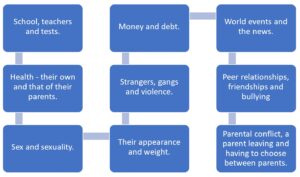It looks like such a simple question but the answer can be complicated. Different children worry about different things and for different reasons. As a parent or carer of an anxious child, you know how hard things can be on a daily basis – so does your child.
Children are born with reflexes such as the Moro Reflex which we may know as the ‘Startle Reflex’ and other basic motor responses which help them eat, protect against sudden movements and signal their ability to thrive in their brand-new environment.
By the time your child is 12 months old, they have an understanding of comfort and security and they begin to develop a fear of separation from those they see as their primary caregivers.
Move on another two years, and your child engages more and more in imaginative and pretend play. This introduces the concept of monsters and by the age of 8 children start to worry about the future and scenarios they present in their own minds. This is the time when their brains grow faster than at any other time in their lives.
Your child is constantly working to interpret the experiences and information they are seeing on a daily basis. With all this going on it is unfortunate that their ability to cope with worry and anxiety is not yet developed and will not develop until adolescence.
Place2Be – a UK based mental health charity – recorded in 2017 that approximately two-thirds of children questioned stated that they worried ‘all the time’. This was further broken down to show that:
Worrying and anxiety can stop children having fun, feeling good and being happy. They have a way of growing, spreading and changing shape, dodging the usual words you say and ways you help diffuse situations and support your child.
There have been many studies over the years and the startling fact is that the things children worry about has remained similar over the last 100 years. These include:

Worry, anxiety and stress may show themselves in physical symptoms such as feeling hot and sweaty, tummy ache, headache, feeling sad, sickness, tiredness or feeling nervous. The ability to think may also be affected. Some children suggest that worry, anxiety and stress can feel like a heavy weight on their back or like something bad is about to happen. Some children may not be able to say exactly what is going on for them.
There is often a genetic link to anxiety. That is to say, if you are a parent to an anxious child, you too may be an anxious person. Please don’t blame yourself for this – worry and anxiety is something we pass on from a completely unconscious place. Helping your child and sharing their journey may also help you on your journey with anxiety and worry. If not, it may be that you too need some help and support.
